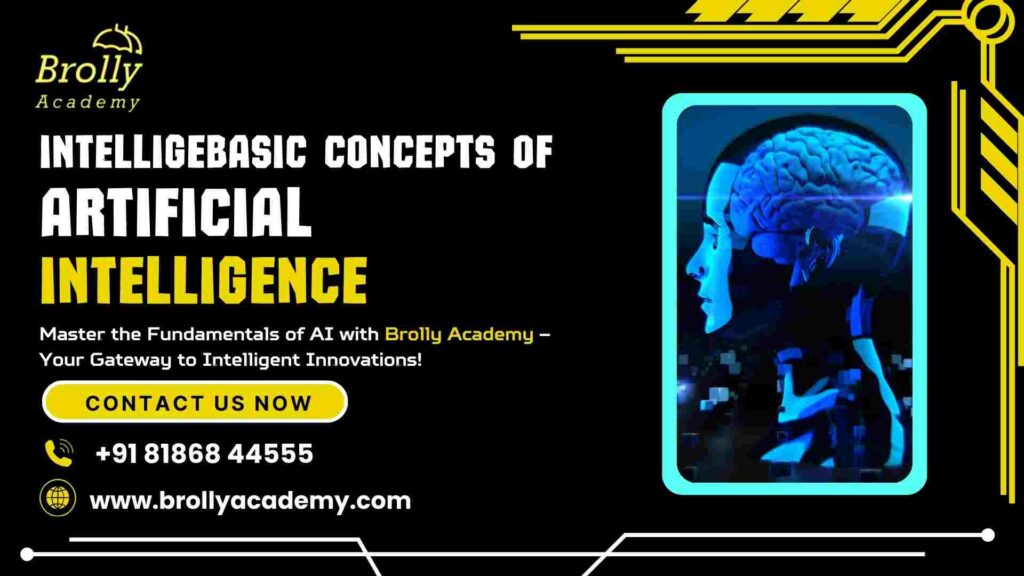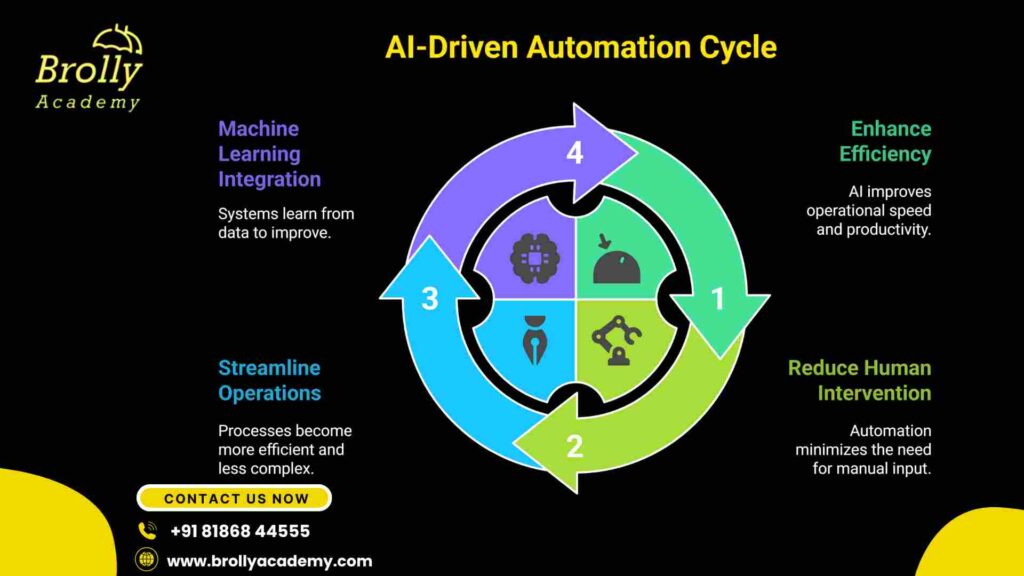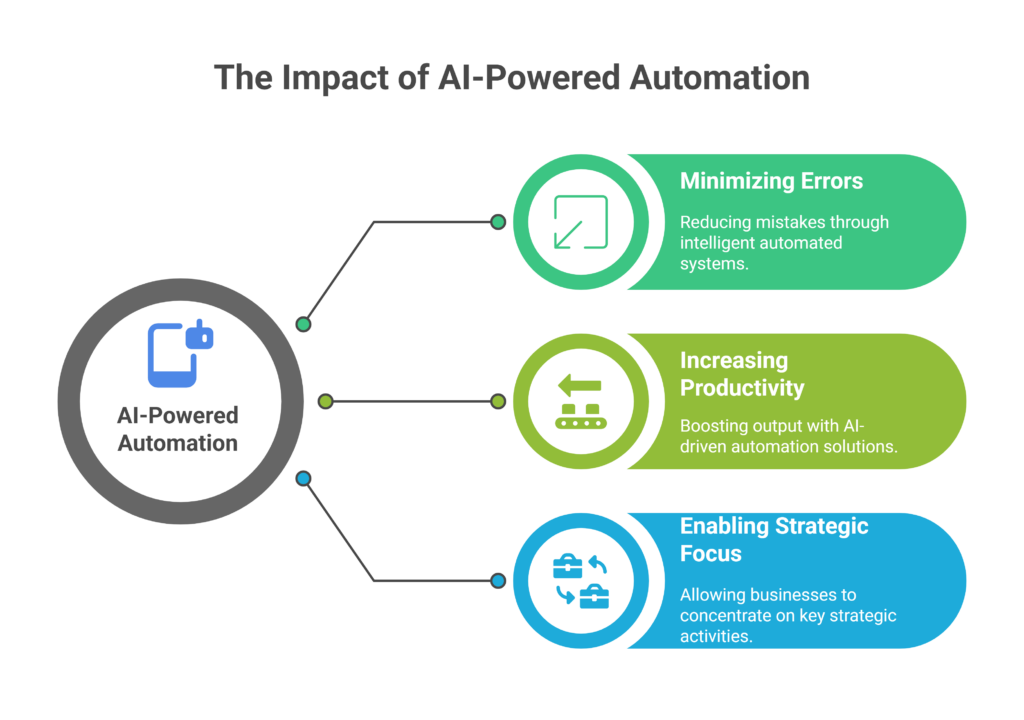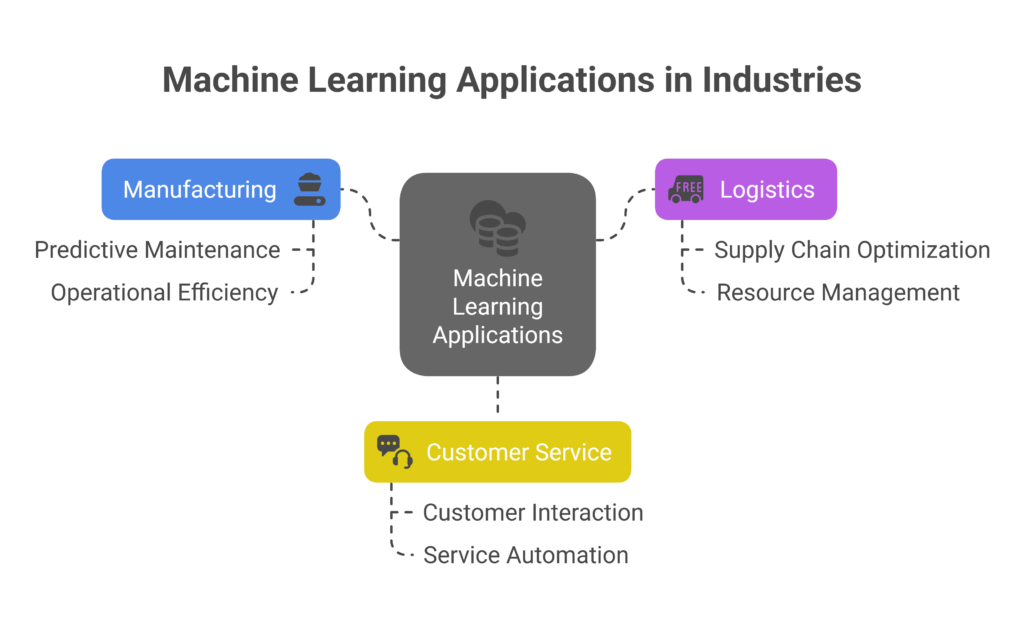Basic Concepts Of Artificial Intelligence

Artificial Intelligence (AI) is a broad field of computer science focused on building systems that can perform tasks that typically require human intelligence. Here are some fundamental concepts of AI:
1. Machine Learning (ML)
- A subset of AI where computers learn from data without being explicitly programmed.
- Types of ML:
- Supervised Learning: The model learns from labeled data.
- Unsupervised Learning: The model finds patterns in unlabeled data.
- Reinforcement Learning: The model learns by interacting with its environment and receiving rewards or penalties.
- Supervised Learning: The model learns from labeled data.
2. Neural Networks & Deep Learning
- Neural Networks: Algorithms inspired by the human brain, consisting of interconnected nodes (neurons).
- Deep Learning: A more advanced form of neural networks with multiple layers (deep neural networks) used for complex tasks like image and speech recognition.
3. Natural Language Processing (NLP)
- AI’s ability to understand, interpret, and generate human language.
- Applications: Chatbots, translation tools, sentiment analysis.
4. Computer Vision
- AI’s ability to interpret and analyze visual data from the real world.
- Used in facial recognition, object detection, and medical image analysis.
5. Expert Systems
- AI systems that mimic human decision-making processes using rules and knowledge bases.
6. Robotics
- AI applied to robots to enable autonomous decision-making and movement.
7. Fuzzy Logic
- A form of reasoning that deals with approximate rather than fixed and exact values, useful in decision-making.
8. AI Ethics & Bias
- AI systems must be designed to avoid bias, ensure fairness, and maintain privacy and security.
Introduction to Artificial Intelligence
What is AI?
- Artificial Intelligence (AI) is the simulation of human intelligence in machines, enabling them to perform tasks that typically require human cognition.
- These tasks include problem-solving, decision-making, speech recognition, and visual perception.
- AI systems are designed to learn from experience, adapt to new inputs, and execute complex tasks without human intervention.
- A crucial subset of AI is Machine Learning (ML), which focuses on teaching computers to learn patterns from data and make predictions.
- The basic concepts of machine learning revolve around training models using large datasets, allowing them to improve over time without explicit programming.
- For beginners wondering “what is machine learning for dummies,” think of it as a way for computers to recognize patterns, just like humans do when learning a new skill.
Importance of AI in Today’s World
1. Automation and Efficiency
2. Decision-Making with Data
3. AI in Everyday Life
4. AI and Job Opportunities
5. Advancements in Deep Learning
6. AI in Education and Learning
Types of Artificial Intelligence
Artificial Intelligence (AI) can be classified based on its capabilities and functionalities. The two major categories of AI are Narrow AI vs. General AI and Weak AI vs. Strong AI. These classifications help us understand the basic concepts of artificial intelligence and how AI systems function at different levels.
Narrow AI vs. General AI
Narrow AI (Weak AI)
Narrow AI, also known as Weak AI, is designed to perform specific tasks with a high degree of efficiency. It cannot think or act beyond its programmed capabilities. Most AI applications we use today, such as recommendation systems, virtual assistants, and facial recognition, fall under this category.
- Examples of basic machine learning examples in Narrow AI include:
- Google Search algorithms
- Chatbots like Siri and Alexa
- Fraud detection in banking
- Self-driving car systems
- Google Search algorithms
Narrow AI utilizes machine learning basic concepts to improve performance over time. For instance, the purpose of machine learning in spam email detection is to classify emails based on past patterns, refining its accuracy with every interaction.
General AI (Strong AI)
Weak AI vs. Strong AI
Weak AI
Weak AI, similar to Narrow AI, is designed to handle specific tasks and lacks self-awareness. It operates under predefined rules and does not possess true intelligence.
- Some basic concepts in machine learning used in Weak AI include:
- Supervised Learning: AI learns from labeled data (e.g., image recognition).
- Unsupervised Learning: AI finds patterns in unlabeled data (e.g., customer segmentation).
- Reinforcement Learning: AI learns from trial and error (e.g., game-playing bots).
- Supervised Learning: AI learns from labeled data (e.g., image recognition).
For beginners, understanding machine learning concepts for beginners like these can help in grasping the basic ML concepts behind Weak AI applications.
Strong AI
Strong AI, unlike Weak AI, has cognitive abilities similar to humans. It can understand, learn, and adapt beyond predefined rules. It is still a theoretical concept, but researchers are working towards it using important concepts in machine learning such as:
- Neural Networks: Inspired by the human brain, used in deep learning.
- Cognitive Computing: AI mimics human thinking processes.
- Self-Learning Algorithms: AI improves autonomously without human intervention.
For those looking to explore these concepts further, resources like machine learning basic concepts PDF and structured training programs at Brolly Academy can help.
Key Concepts in AI
Artificial Intelligence (AI) is built on several key principles and technologies that allow machines to perform intelligent tasks. Understanding these basic AI and ML concepts is essential for anyone looking to explore AI applications. Here, we will discuss the major components of AI, including Machine Learning, Deep Learning, Natural Language Processing, Computer Vision, Expert Systems, Robotics, and Fuzzy Logic.
Machine Learning (ML)
Machine Learning is a subset of AI that enables computers to learn from data and make decisions without explicit programming. The purpose of machine learning is to identify patterns, make predictions, and automate decision-making processes.
- Basic ML concepts include:
- Supervised Learning – Learning from labeled data.
- Unsupervised Learning – Finding patterns in unlabeled data.
- Reinforcement Learning – Learning through rewards and penalties.
- Supervised Learning – Learning from labeled data.
Some basic machine learning examples include spam detection in emails, recommendation systems on Netflix, and fraud detection in banking. If you’re new to AI, you can start with machine learning concepts for beginners to understand the basic definition of machine learning and explore resources like machine learning basic concepts PDF.
Deep Learning & Neural Networks
Deep Learning is a specialized form of ML that uses artificial neural networks to process data in layers. This technology powers complex AI applications such as self-driving cars and voice assistants.
Basic concepts of deep learning include:
- Neural Networks – Modeled after the human brain, used for recognizing patterns.
- Convolutional Neural Networks (CNNs) – Used in image processing.
- Recurrent Neural Networks (RNNs) – Used in speech and text analysis.
- Neural Networks – Modeled after the human brain, used for recognizing patterns.
These key concepts of machine learning are essential for anyone looking to specialize in AI.
Natural Language Processing (NLP)
Natural Language Processing enables machines to understand, interpret, and generate human language. It is widely used in chatbots, language translation, and sentiment analysis.
Some machine learning important concepts in NLP include:
- Text Tokenization – Breaking text into smaller parts for analysis.
- Speech Recognition – Converting spoken language into text.
Sentiment Analysis – Understanding emotions behind text.
Computer Vision
Computer Vision allows machines to interpret and analyze visual data. It is used in facial recognition, medical imaging, and autonomous vehicles.
- What is the machine learning process in Computer Vision?
- Collecting and preprocessing images.
- Training an ML model with labeled images.
- Using AI algorithms to detect patterns and make predictions.
- Collecting and preprocessing images.
Expert Systems
Expert Systems are AI-based programs that mimic human decision-making abilities in specific domains. They are widely used in medical diagnosis, financial analysis, and troubleshooting systems. These systems rely on basic machine learning definitions and predefined rule-based logic to function effectively.
Robotics
AI-powered robots perform complex tasks in industries like manufacturing, healthcare, and space exploration. They use key concepts in machine learning such as Reinforcement Learning to adapt to new environments.
- Basic ML concepts in Robotics include:
- Sensor-based learning for real-time interaction.
- Motion planning using AI algorithms.
- Autonomous decision-making through AI models.
- Sensor-based learning for real-time interaction.
Fuzzy Logic
Fuzzy Logic is an AI approach that handles uncertainty and approximate reasoning. It is used in AI-powered decision systems where binary (yes/no) logic is insufficient.
- Some important concepts in machine learning used in Fuzzy Logic include:
- Handling imprecise data.
- Making decisions based on partial truth.
- AI-driven control systems in automation.
- Handling imprecise data.
For those interested in learning more about these AI concepts, structured training programs at Brolly Academy offer in-depth courses on basic concepts of artificial intelligence and machine learning concepts list to help beginners and professionals build expertise in AI.
Applications of AI in Various Industries
AI in Healthcare
Key AI Applications in Healthcare:
- Medical Imaging & Diagnosis: AI-powered tools analyze medical scans (X-rays, MRIs) to detect diseases like cancer.
- Personalized Treatment Plans: AI algorithms predict patient responses to medications.
- Predictive Analytics: AI helps prevent diseases by analyzing patient history and risk factors.
- Robotic Surgery: AI-driven robots assist in complex surgical procedures with precision.
The purpose of machine learning in healthcare is to improve accuracy, reduce costs, and enhance patient care. AI’s integration into healthcare is a perfect example of how key concepts in machine learning contribute to real-time solutions.
AI in Finance
Key AI Applications in Finance:
- Fraud Detection: AI systems analyze transaction patterns to flag fraudulent activities.
- Algorithmic Trading: AI automates stock trading by analyzing market trends.
- Chatbots & Virtual Assistants: AI-powered bots provide 24/7 customer support.
- Risk Assessment: AI evaluates credit scores and predicts loan repayment behavior.
Financial analysts rely on machine learning important concepts to process vast amounts of data and make accurate predictions.
AI in Education
Key AI Applications in Education:
- Personalized Learning: AI adapts to students’ progress and customizes lessons.
- Automated Grading: AI assesses assignments and provides instant feedback.
- Virtual Tutors: AI chatbots assist students with their queries 24/7.
- Language Processing: AI improves speech-to-text accuracy for learning tools.
Online learning platforms like Brolly Academy integrate basic concepts of artificial intelligence to create adaptive learning modules, ensuring students receive a tailored education experience.
AI in Business & Marketing
Key AI Applications in Business & Marketing:
- Customer Insights: AI analyzes data to predict customer preferences.
- Chatbots & Virtual Assistants: AI-driven bots handle customer queries in real-time.
- Content Recommendation: AI personalizes content on platforms like Netflix and YouTube.
- Ad Optimization: AI enhances digital marketing by targeting specific audiences.
By using deep learning basic concepts, businesses can process vast amounts of data to improve their marketing strategies. AI is playing a crucial role across industries, and its potential is expanding rapidly. Platforms like Brolly Academy are embracing these advancements to deliver high-quality training on AI, basic concepts in machine learning, and more.
Real-World Case Studies of AI
How Tesla Uses AI for Self-Driving Cars
Tesla integrates Artificial Intelligence (AI) into its vehicles to enhance driving safety and efficiency. The company’s Autopilot and Full Self-Driving (FSD) systems use AI to help cars navigate roads, recognize objects, and make real-time driving decisions.
How AI Works in Tesla Cars
Computer Vision – Tesla vehicles rely on cameras and sensors to detect cars, pedestrians, traffic signals, and road signs. AI processes this data to interpret the surroundings.
Deep Learning – The system learns from millions of driving scenarios to improve how the car reacts to different conditions, such as stopping at a red light or making a lane change.
Neural Networks – AI-powered models analyze real-time road data, predict how objects move, and assist the car in making safe driving decisions.
Smart Decision-Making – AI continuously adjusts speed, applies brakes, and steers the vehicle to follow traffic rules and avoid obstacles.
Real-World Impact of Tesla’s AI
Enhanced Safety – AI helps reduce accidents by minimizing human errors.
Traffic Efficiency – AI-driven systems optimize driving to reduce congestion and improve travel times.
Continuous Improvement – Tesla cars receive over-the-air software updates, enhancing their self-driving capabilities.
Tesla’s AI is shaping the future of autonomous driving, making transportation safer and more intelligent.
How to Learn AI?
Essential Skills for AI Professionals
Key Skills Required for AI Learning:
- Programming Languages: Python, R, and Java are commonly used for AI development.
- Mathematics & Statistics: Knowledge of linear algebra, probability, and calculus is essential.
- Machine Learning & Deep Learning: Understanding basic concepts of deep learning and machine learning important concepts helps in developing AI models.
- Data Science & Analytics: AI professionals must be proficient in handling and processing large datasets.
- Neural Networks & NLP: Learning about deep learning basic concepts and natural language processing is crucial for AI applications.
Beginners can start with machine learning concepts for dummies to build a strong understanding of the field.
Best AI Courses & Training Programs
Top AI Learning Resources:
- Online Courses: Platforms such as Brolly Academy, Coursera, Udacity, and edX offer AI training with certifications.
- Books & PDFs: Reading materials, such as the Machine Learning Basic Concepts PDF, help facilitate self-paced learning.
- Bootcamps & Workshops: Intensive AI training programs provide hands-on experience with real-time projects.
- Degree Programs: Universities offer specialized AI and ML courses for in-depth learning.
For those new to AI, starting with basic machine learning examples and a machine learning concepts list is a great way to gain foundational knowledge.
AI Project Ideas for Beginners
Chatbot using Python – Build a simple chatbot using Python and NLP libraries like NLTK
Why Choose Brolly Academy for AI Training in Hyderabad?
If you’re looking for a professional AI training institute, Brolly Academy in Hyderabad is the best choice.
Key Benefits of Brolly Academy’s AI Training:
- Comprehensive Curriculum: Covers basic concepts of artificial intelligence, what is machine learning process, and real-time AI applications.
- Hands-on Learning: Includes practical training with basic AI and ML concepts to build expertise.
- Expert Instructors: Industry professionals guide students through advanced machine learning basic definitions and AI methodologies.
- Flexible Learning Modes: Both online and offline courses are available to suit different learning preferences.
- Career Support: Assistance with job placements, resume building, and interview preparation.
Brolly Academy’s AI training is ideal for machine learning concepts for beginners as well as advanced learners looking to specialize in AI technologies. Mastering AI requires dedication, practice, and the right guidance. Whether you’re exploring important concepts in machine learning or diving into machine learning basic concepts PDF, the right training program can set you on the path to success.
Challenges and Ethical Concerns in AI
As AI continues to evolve, it raises several ethical concerns and challenges. While AI and the concept of machine learning in AI have transformed industries, issues like bias, privacy risks, and security threats need to be addressed to ensure ethical AI development. This section explores the key challenges in AI and how they impact society.
Bias in AI
Common AI Bias Issues:
- Data Bias: AI models trained on unbalanced data may favor certain groups.
- Algorithmic Bias: Some basic machine learning algorithms unintentionally favor one outcome over another.
- Ethical Concerns: Bias in AI can lead to discrimination in hiring, lending, and healthcare.
Understanding what is machine learning and why is it important helps in developing fair and unbiased AI models. Organizations must focus on key concepts of machine learning to improve data diversity and eliminate bias in AI systems.
Privacy and Security Issues
Major AI Privacy Challenges:
- Data Breaches: Hackers can exploit vulnerabilities in AI-driven systems.
- Surveillance Concerns: AI is used for facial recognition, which raises privacy issues.
- Data Ownership: Who controls and uses AI-generated data?
These issues highlight the need for ethical AI frameworks and regulations. The concept of machine learning typically involves working with large datasets, making security a top priority in AI development.
The Future of AI and Ethical AI Development
Key Ethical AI Development Strategies:
- Regulations & Policies: Governments and organizations must set ethical guidelines for AI use.
- Fair AI Models: Developers must ensure AI algorithms follow fundamental mathematical concepts for machine learning in science to avoid bias.
- Transparency in AI: Companies should disclose how their AI models make decisions.
Future Trends in AI
AI in Automation
AI is revolutionizing automation by enhancing efficiency, reducing human intervention, and streamlining business operations. The concept of machine learning plays a crucial role in automation by enabling systems to learn from data and improve over time.

In industries such as manufacturing, logistics, and customer service, basic machine learning examples include predictive maintenance, chatbots, and intelligent supply chain management. These applications utilize machine learning basic concepts such as supervised and unsupervised learning to optimize operations.

The purpose of machine learning in automation is to minimize errors, increase productivity, and enable businesses to focus on strategic tasks. With advancements in basic concepts of artificial intelligence, AI-powered automation is expected to grow exponentially, impacting sectors ranging from healthcare to finance.

AI in Cybersecurity
Cybersecurity is a critical area where AI is making significant advancements. AI-driven security solutions leverage key concepts of machine learning to detect and prevent cyber threats in real-time.
AI and the Metaverse
The metaverse is an emerging digital space that blends virtual reality (VR), augmented reality (AR), and AI to create immersive experiences. AI enhances the metaverse by providing intelligent interactions, content generation, and personalized experiences.
One of the core applications of AI in the metaverse is basic ai and ml concepts, where AI-driven avatars, chatbots, and recommendation engines create dynamic user experiences.
The basic definition of machine learning is crucial here, as AI enables the metaverse to understand user behavior and preferences.
AI breakthroughs with real-world implementations
How GPT-4 Turbo is Transforming Customer Support
AI-powered chatbots and virtual assistants have changed the way businesses handle customer support.
One of the latest advancements in this field is GPT-4 Turbo, a more efficient and faster version of OpenAI’s language model.
Many companies are now using GPT-4 Turbo to improve customer service in the following ways:
24/7 Support: Unlike human agents, AI chatbots can handle customer queries anytime, without breaks.
Faster Responses: GPT-4 Turbo processes information quickly, providing instant replies to common questions.
Personalized Interactions: AI can analyze past interactions to give more relevant responses.
Handling Multiple Customers: AI can manage thousands of conversations at once, reducing waiting times.
Cost-Effective Solution: Businesses can reduce support costs by automating repetitive tasks.
Companies like e-commerce platforms, banks, and tech support services are already using AI-powered chatbots to improve customer experiences.
While AI can’t replace human agents completely, it enhances efficiency and helps businesses provide faster, smarter, and more accessible customer support.
Conclusion
Recap of AI Fundamentals
- AI has transformed industries by integrating basic concepts of artificial intelligence into automation, cybersecurity, and the metaverse.
- Understanding machine learning basic concepts allows businesses and individuals to harness AI’s potential effectively.
- From basic machine learning examples like predictive analytics to deep learning basic concepts used in virtual environments, AI continues to evolve and shape our digital future.
How to Get Started with AI at Brolly Academy
For those looking to build a career in AI, Brolly Academy offers comprehensive training programs covering key concepts in machine learning and basic ai and ml concepts.
Whether you are a beginner or an experienced professional, our courses provide hands-on learning in what is machine learning process and its real-time applications.
Join Brolly Academy to gain expertise in AI and stay ahead in this rapidly growing field.
FAQs : Basic Concepts of Artificial Intelligence
What is the basic concept of AI?
The basic concept of Artificial Intelligence (AI) is the ability of machines to mimic human intelligence, including learning, reasoning, problem-solving, perception, and language understanding. AI systems use basic concepts of artificial intelligence such as machine learning, neural networks, natural language processing (NLP), and computer vision to perform tasks traditionally requiring human intelligence.
Are there 4 basic AI concepts?
Yes, AI is often categorized into four basic concepts:
- Reactive Machines – AI systems that only react to inputs and do not store past experiences (e.g., IBM’s Deep Blue).
- Limited Memory – AI that learns from past data to improve decision-making (e.g., self-driving cars).
- Theory of Mind – AI that understands human emotions and interactions (still in research).
- Self-Aware AI – AI with self-consciousness and independent thought (a theoretical concept).
What are the basics of artificial intelligence?
The basics of AI include:
- Machine Learning (ML): AI learns from data using algorithms (basic concepts of machine learning).
- Deep Learning: A subset of ML that uses neural networks for advanced decision-making (deep learning basic concepts).
- Natural Language Processing (NLP): AI can understand and process human language.
- Computer Vision: AI interprets images and videos for analysis.
- Machine Learning Process: Data collection → Model training → Testing → Deployment.
What are the basic concepts of artificial intelligence?
The basic concepts of artificial intelligence include:
- Machine Learning (ML): AI learns from data without explicit programming.
- Deep Learning: A subset of ML that uses neural networks for advanced decision-making.
- Natural Language Processing (NLP): AI understands and processes human language.
- Computer Vision: AI interprets images and videos to recognize patterns.
- Reinforcement Learning: AI learns through trial and error to optimize decisions.
What is machine learning, and how does it relate to AI?
Machine Learning (ML) is a subset of AI that enables computers to learn from data and improve performance over time without being explicitly programmed. It includes:
- Supervised Learning: Learning from labeled data.
- Unsupervised Learning: Identifying patterns in unlabeled data.
- Reinforcement Learning: Learning by receiving rewards or penalties based on actions.
What are the different types of AI?
AI is categorized into three types based on capability:
- Artificial Narrow Intelligence (ANI): AI specialized for a specific task (e.g., chatbots, recommendation systems).
- Artificial General Intelligence (AGI): AI with human-like reasoning ability (still under research).
- Artificial Super Intelligence (ASI): AI surpassing human intelligence (theoretical concept).
What are the four basic AI concepts?
The four key AI concepts are:
- Reactive Machines – AI reacts to inputs without memory (e.g., IBM’s Deep Blue).
- Limited Memory – AI learns from past experiences to make better decisions (e.g., self-driving cars).
- Theory of Mind – AI understands emotions and human interactions (under development).
- Self-Aware AI – AI with self-consciousness and independent thought (theoretical).
What is the difference between AI and machine learning?
AI is the broader concept of machines simulating human intelligence, while ML is a subset of AI focused on algorithms that enable systems to learn from data.
What is the machine learning process?
The machine learning process consists of:
- Data Collection – Gathering raw data.
- Data Preprocessing – Cleaning and organizing data.
- Model Training – Using ML algorithms to train the system.
- Model Testing & Evaluation – Assessing the model’s accuracy.
- Deployment & Improvement – Deploying the model and improving it over time.
What are some basic machine learning examples in daily life?
Examples include:
- Spam filters in email services (Gmail, Outlook).
- Personalized recommendations (Netflix, YouTube, Amazon).
- Virtual assistants (Siri, Google Assistant, Alexa).
- Facial recognition systems (iPhone Face ID, CCTV security).
- Self-driving cars (Tesla’s autopilot mode).
What are key concepts of reinforcement learning?
Reinforcement learning is an AI technique where an agent learns by interacting with an environment and receiving rewards or penalties. Its key concepts include:
- Agent: The decision-maker (AI system).
- Environment: The setting in which the agent operates.
- Actions: Choices the agent can make.
- Rewards: Positive or negative feedback based on the action.
What is the role of AI in cybersecurity?
AI enhances cybersecurity by:
- Detecting cyber threats using anomaly detection algorithms.
- Identifying malware and phishing attempts through pattern recognition.
- Automating security monitoring to respond to attacks in real-time.
- Strengthening encryption and authentication methods to secure sensitive data.
What is the machine learning theory?
Machine learning theory focuses on understanding and designing algorithms that learn from data. It includes:
- Supervised learning: Training a model on labeled data.
- Unsupervised learning: Discovering hidden patterns in data.
- Reinforcement learning: Learning based on rewards and penalties.
What are fundamental mathematical concepts for machine learning?
The essential mathematical concepts in ML include:
- Linear Algebra: Understanding matrices and vectors for data representation.
- Probability & Statistics: Used for data analysis and predictions.
- Calculus: Helps in optimizing machine learning models.
- Optimization Techniques: Used to minimize errors in AI models.
What is the concept of machine learning in AI?
Machine learning in AI is the process of enabling machines to learn from data and improve their performance without human intervention. It involves training models to recognize patterns, make predictions, and automate decision-making.
How does a machine learning model work?
A machine learning model follows these steps:
- Data Collection – Gathering relevant information.
- Data Processing – Cleaning and structuring the data.
- Model Training – Feeding data into an algorithm to learn patterns.
- Testing & Evaluation – Assessing the model’s performance.
- Deployment & Monitoring – Using the model in real-time applications.
What is the importance of AI in automation?
AI-driven automation:
- Reduces human intervention in repetitive tasks.
- Enhances efficiency in industries like manufacturing, finance, and customer service.
- Improves decision-making with real-time data analysis.
- Optimizes supply chain management and predictive maintenance.
How can I learn AI and machine learning from scratch?
To start learning AI and ML:
- Understand basic concepts of artificial intelligence and machine learning.
- Learn programming languages like Python (important for AI development).
- Study machine learning algorithms and how they work.
- Take an AI course at Brolly Academy to gain hands-on experience.
- Practice with real-time AI projects like chatbot development, image recognition, and predictive analytics.

